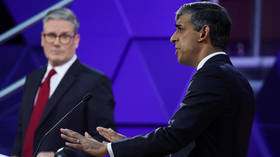Nigel Farage is ‘coming for Labour’ after ‘the end’ of the Tories
The Reform UK leader has been elected as a member of parliament on his eighth attempt
Eurosceptic firebrand Nigel Farage won a seat in the UK parliament for the first time in Thursday’s general election, defeating his Conservative challenger in the Essex constituency of Clacton – and promising to mount a strong opposition to Labour.
Farage called his victory “the first step of something that is going to stun all of you,” promising to turn his Reform UK party into the main opposition. The former Brexit Party, created in 2018, is projected to win 13 out of 650 seats.
“There is a massive gap on the centre-right of British politics and my job is to fill it,” he said, claiming: “this is the beginning of the end of the Conservative Party.”
The Tories have suffered their worst-ever election defeat, securing only 131 seats, according to exit polls and early results. Before Prime Minister Rishi Sunak dissolved parliament and called a general election, the ruling party held a majority of 344 seats.
Farage proclaimed that his party would “now be targeting Labour votes,” as the polls suggested the centre-left landslide was motivated by resentment against the Conservatives, rather than confidence in party leader Keir Starmer.
“What is interesting is, there’s no enthusiasm for Labour, there’s no enthusiasm for Starmer whatsoever. In fact, about half of the vote is simply an anti-Conservative vote,” he said. “We’re coming for Labour, be in no doubt about that.”
Farage served as a Member of the European Parliament (MEP) from 1999 until the UK’s withdrawal from the EU in 2020, but had never previously been elected to the British Parliament.
Ahead of the election, Farage was accused of being a Moscow sympathizer after he blamed NATO expansion in Europe for the Ukraine conflict. During a BBC interview last month he claimed the US-led bloc gave the Russian government an excuse to rally domestic support for the military operation.
Russian Ambassador to the UK Andrey Kelin said he expected accusations of election interference, but that the change of government was unlikely to alter Britain’s policy towards Russia.






Comments are closed.